"The Other Hundred" is a unique photo book project aimed as a counterpoint to the Forbes 100 and other media rich lists by telling the stories of people around the world who are not rich but whose lives, struggles and achievements deserve to be celebrated. Its 100 photo stories move beyond the stereotypes and clichés that fill so much of the world's media to explore the lives of people whose aspirations and achievements are at least as noteworthy as any member of the world's richest 1 percent.
During World War II, many women in Belarus served on the front lines. When Germany invaded the Soviet Union in 1941, most of these women were between 16 and 18 years old. For the next four years, they served as nurses, truck drivers, partisans and communications operators. At the end of the war, they were awarded medals and prizes and named “Heroes of the Nation." As they approach the end of their lives, and despite the breakup of the former Soviet Union, their contributions are still remembered with invitations to attend parades and to visit schools to tell children about their experiences.
Photographer: Agnieszka Rayss
Lida Pietrovna Bondar, nurse.
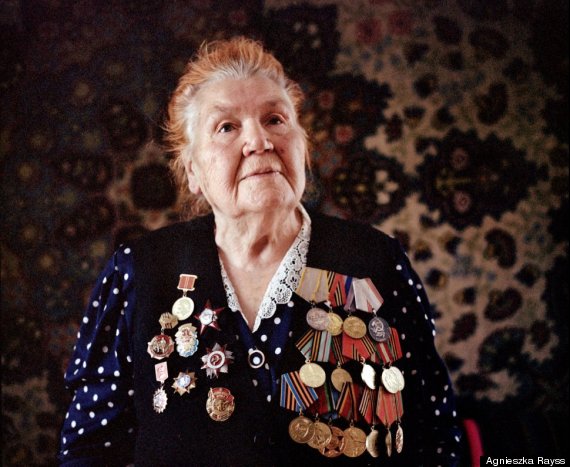 Zinaida Konstantinovna, now of Grodno, Belarus, worked for Soviet Army Communications during the war.
Zinaida Konstantinovna, now of Grodno, Belarus, worked for Soviet Army Communications during the war.
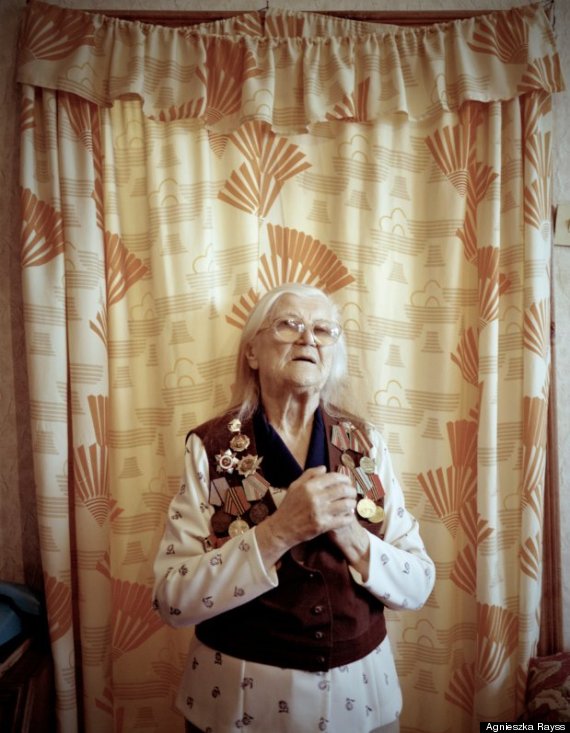 Elizaveta Ivanonvna Zienievich, partisan nurse.
Elizaveta Ivanonvna Zienievich, partisan nurse.
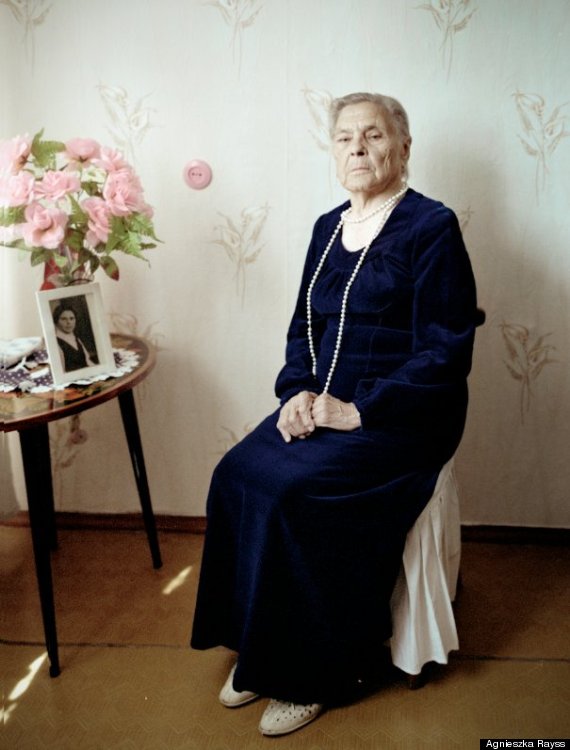 Anastasia Konstantinova Wishnievska, truck driver.
Anastasia Konstantinova Wishnievska, truck driver.
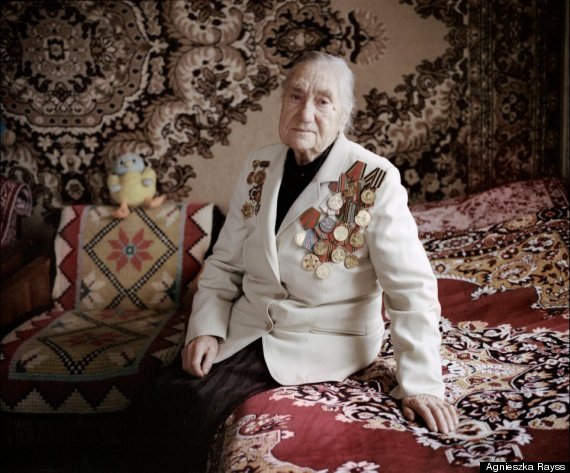 Maria Antonovna Pospielova of Zaskovichi, Belarus. She served in the partisan resistance force against the Nazi occupation.
Maria Antonovna Pospielova of Zaskovichi, Belarus. She served in the partisan resistance force against the Nazi occupation.
Maria Antonovna Pospielova’s dress uniform with her military honors.
God gave me the courage to fight for the truth, and I have never been afraid to speak the truth. I think that if someone is righteous, God sees it and protects him. That’s how it was with me. When I was already in the partisan force, I was walking alone through the woods and I got surrounded by a pack of wolves. I thought I wasn’t going to make it. I had a pistol with only two bullets. I climbed onto the trunk of a felled pine tree, crossed myself, and they finally left" -- Maria Antonovna Pospielova.
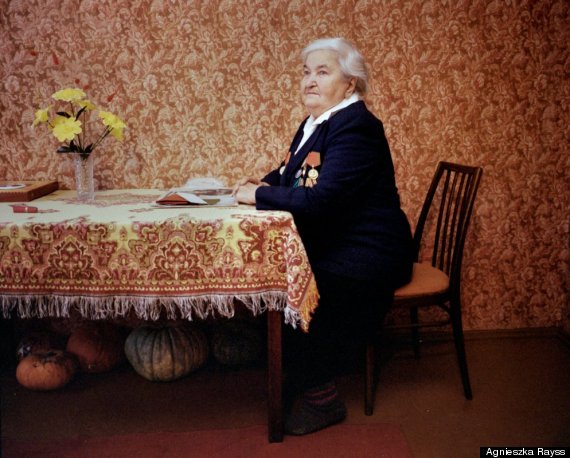 Zinaida Nikolaieva Famienska, partisan.
Zinaida Nikolaieva Famienska, partisan.
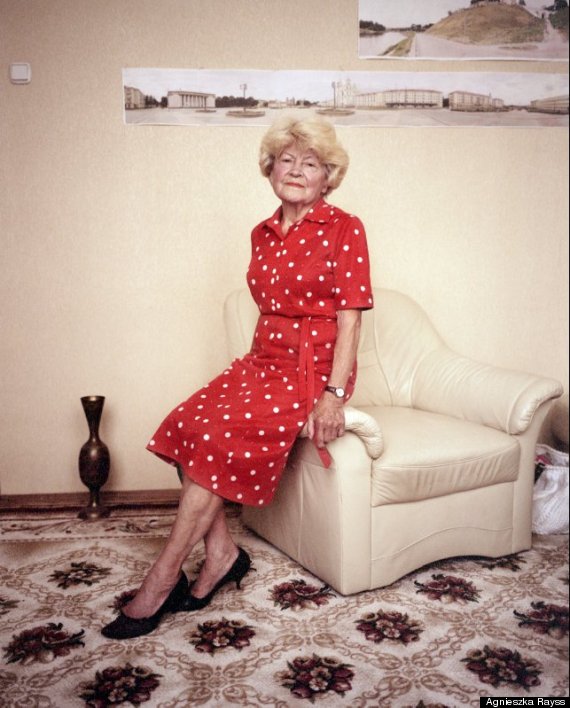 Valentina Pietrovna Baranova, army communications worker, head of the veterans’ union in Grodno.
Valentina Pietrovna Baranova, army communications worker, head of the veterans’ union in Grodno.
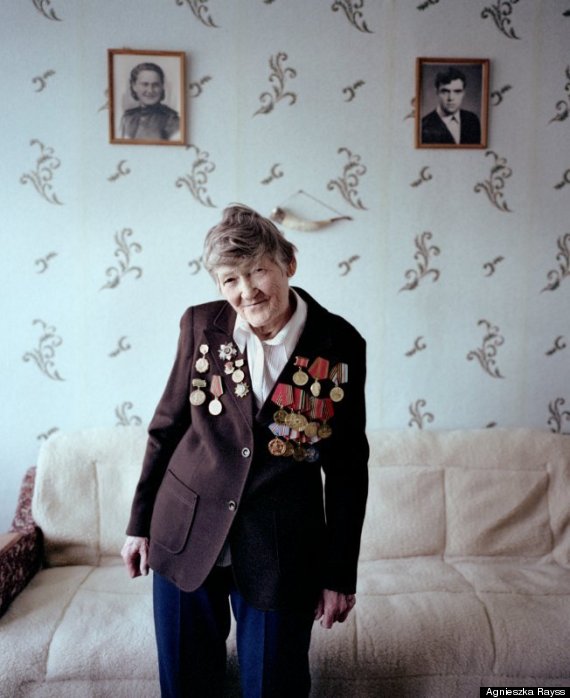 Galina Ivanova Pagarelava of Shchuchyn, Belarus, served as a nurse in the war..
Galina Ivanova Pagarelava of Shchuchyn, Belarus, served as a nurse in the war..
“I was a nurse and I got into the front-bound ambulance train. I was at the front, I collected the wounded and drove them to the hospital. They were heavy -- one had to carry them on one’s own arms and back. When we took the wounded away, we were often bombarded by the Germans. We had "death passports," metal tags with our name and last name to identify us in case we were killed. This is how the four years of war went by. I was at the Leningrad front, the Baltic front and the Karelian front all the way beyond the Arctic Circle. It was daylight all the time at the Arctic front. We wrote letters on the train — at night. Belarus is my second homeland. I was born in the Ural, and I have lived in Shchuchyn since 1954. I have no regrets. My son turned out great. I had an interesting life” -- Galina Ivanova Pagarelava.
Support HuffPost
Our 2024 Coverage Needs You
Your Loyalty Means The World To Us
At HuffPost, we believe that everyone needs high-quality journalism, but we understand that not everyone can afford to pay for expensive news subscriptions. That is why we are committed to providing deeply reported, carefully fact-checked news that is freely accessible to everyone.
Whether you come to HuffPost for updates on the 2024 presidential race, hard-hitting investigations into critical issues facing our country today, or trending stories that make you laugh, we appreciate you. The truth is, news costs money to produce, and we are proud that we have never put our stories behind an expensive paywall.
Would you join us to help keep our stories free for all? Your contribution of as little as $2 will go a long way.
Can't afford to donate? Support HuffPost by creating a free account and log in while you read.
As Americans head to the polls in 2024, the very future of our country is at stake. At HuffPost, we believe that a free press is critical to creating well-informed voters. That's why our journalism is free for everyone, even though other newsrooms retreat behind expensive paywalls.
Our journalists will continue to cover the twists and turns during this historic presidential election. With your help, we'll bring you hard-hitting investigations, well-researched analysis and timely takes you can't find elsewhere. Reporting in this current political climate is a responsibility we do not take lightly, and we thank you for your support.
Contribute as little as $2 to keep our news free for all.
Can't afford to donate? Support HuffPost by creating a free account and log in while you read.
Dear HuffPost Reader
Thank you for your past contribution to HuffPost. We are sincerely grateful for readers like you who help us ensure that we can keep our journalism free for everyone.
The stakes are high this year, and our 2024 coverage could use continued support. Would you consider becoming a regular HuffPost contributor?
Dear HuffPost Reader
Thank you for your past contribution to HuffPost. We are sincerely grateful for readers like you who help us ensure that we can keep our journalism free for everyone.
The stakes are high this year, and our 2024 coverage could use continued support. If circumstances have changed since you last contributed, we hope you’ll consider contributing to HuffPost once more.
Already contributed? Log in to hide these messages.
 Zinaida Konstantinovna, now of Grodno, Belarus, worked for Soviet Army Communications during the war.
Zinaida Konstantinovna, now of Grodno, Belarus, worked for Soviet Army Communications during the war. Elizaveta Ivanonvna Zienievich, partisan nurse.
Elizaveta Ivanonvna Zienievich, partisan nurse. Anastasia Konstantinova Wishnievska, truck driver.
Anastasia Konstantinova Wishnievska, truck driver. Maria Antonovna Pospielova of Zaskovichi, Belarus. She served in the partisan resistance force against the Nazi occupation.
Maria Antonovna Pospielova of Zaskovichi, Belarus. She served in the partisan resistance force against the Nazi occupation.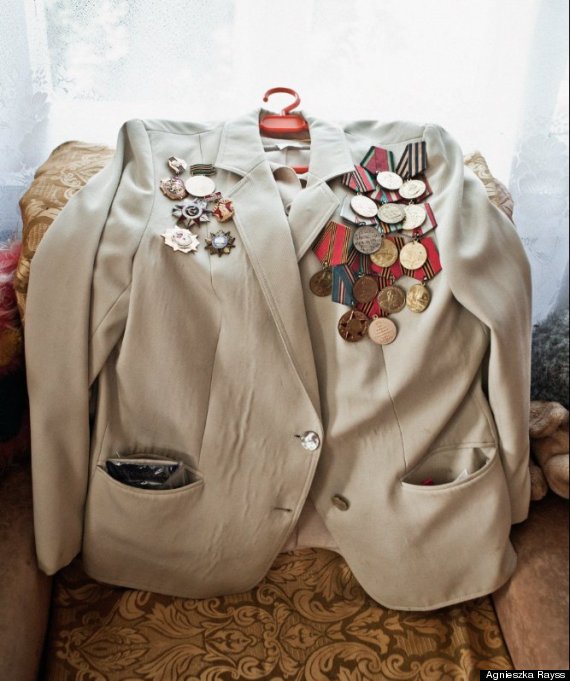
 Zinaida Nikolaieva Famienska, partisan.
Zinaida Nikolaieva Famienska, partisan. Valentina Pietrovna Baranova, army communications worker, head of the veterans’ union in Grodno.
Valentina Pietrovna Baranova, army communications worker, head of the veterans’ union in Grodno. Galina Ivanova Pagarelava of Shchuchyn, Belarus, served as a nurse in the war..
Galina Ivanova Pagarelava of Shchuchyn, Belarus, served as a nurse in the war..